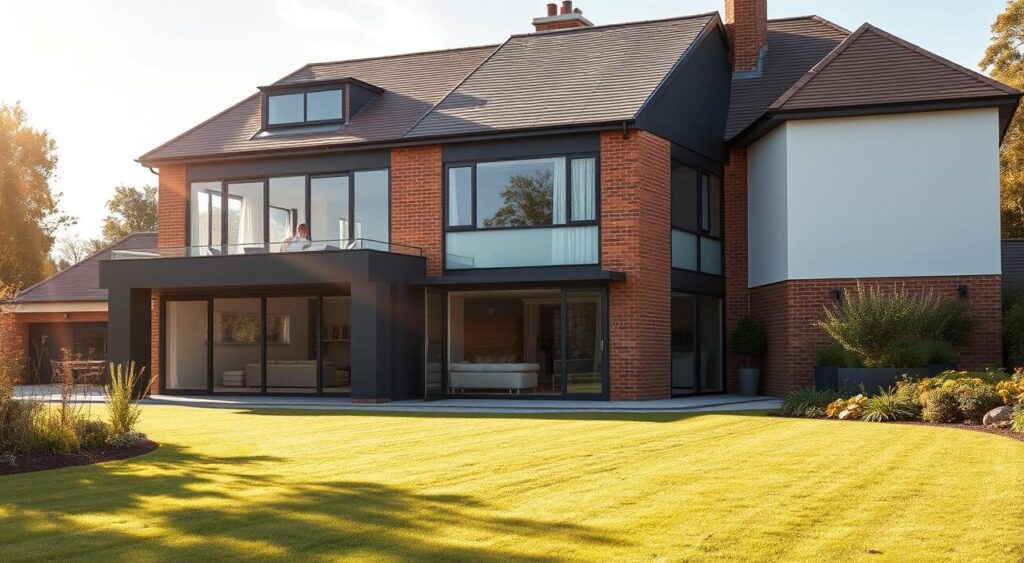Wondering about the real UK house extension cost in 2025? Whether you’re adding a kitchen, loft, or extra room, understanding the price factors can help you budget smartly. In this guide, we break down average extension costs across the UK, what affects the price, and how you can save money without compromising on quality.
As a homeowner, knowing the financial side is key. The house extension costs UK can quickly add up. You want to be ready for the cost. In this article, we’ll look at what affects the cost of a house extension. This will help you plan your project with confidence.
Key Takeaways
- Understand the factors that influence the cost of a house extension.
- Learn how to budget for your project effectively.
- Discover ways to save on house extension costs.
- Get an idea of the average cost per square metre.
- Find out how to plan your extension to meet your needs and budget.
The Current State of UK House Extension Costs in 2025
As we enter 2025, knowing the current house extension costs in the UK is key for homeowners. The cost can change a lot based on the type of extension, materials, and where you live.
Average National Costs Overview
The average cost of a house extension in the UK is important for homeowners to know. By 2025, the national average is influenced by construction costs, labour, and project complexity. Homeowners can expect to pay between £1,500 to £3,000 per square metre for a standard extension, but costs can vary.
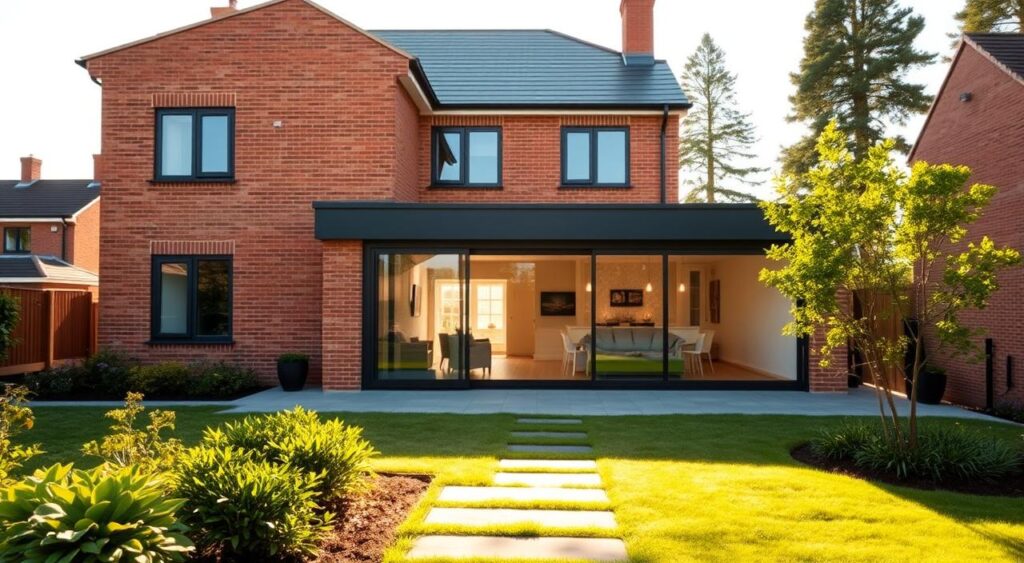
Regional Price Variations Across the UK
Prices for house extensions vary across the UK. London and the South East tend to be more expensive due to high demand and living costs. In contrast, the North East and Wales might offer better prices. It’s vital for homeowners to check their region’s costs to plan their budget.
Post-Pandemic Price Trends
The COVID-19 pandemic has changed the construction industry, affecting house extension costs. Supply chain issues and demand shifts have led to price changes. By 2025, the industry is adjusting, with homeowners facing higher costs due to material shortages and labour costs. Knowing these trends helps homeowners plan their extension projects better.
Types of House Extensions and Their Costs
There are many types of house extensions, each with its own benefits and prices. Knowing these differences is key for homeowners wanting to add space without overspending.
Single-Storey Extensions
Single-storey extensions are a favourite among homeowners. They can be split into kitchen and living room extensions.
Kitchen Extensions
Kitchen extensions boost your home’s value. Prices vary from £1,500 to £3,000 per square meter, depending on the materials and features.
Living Room Extensions
Living room extensions add space for fun and relaxation. Their prices are similar to kitchen extensions, ranging from £1,500 to £3,000 per square meter.
Double-Storey Extensions
Double-storey extensions add a lot of space, potentially doubling your living area. They are more complex and cost between £2,000 to £4,000 per square meter.
Rear and Side Extensions
Rear and side extensions are flexible and can fit many home designs. Prices vary based on size, materials, and complexity.
Loft Conversions
Loft conversions are a smart way to increase space without expanding your home’s footprint. Costs can range from £20,000 to £80,000 or more, depending on the complexity and structural needs.
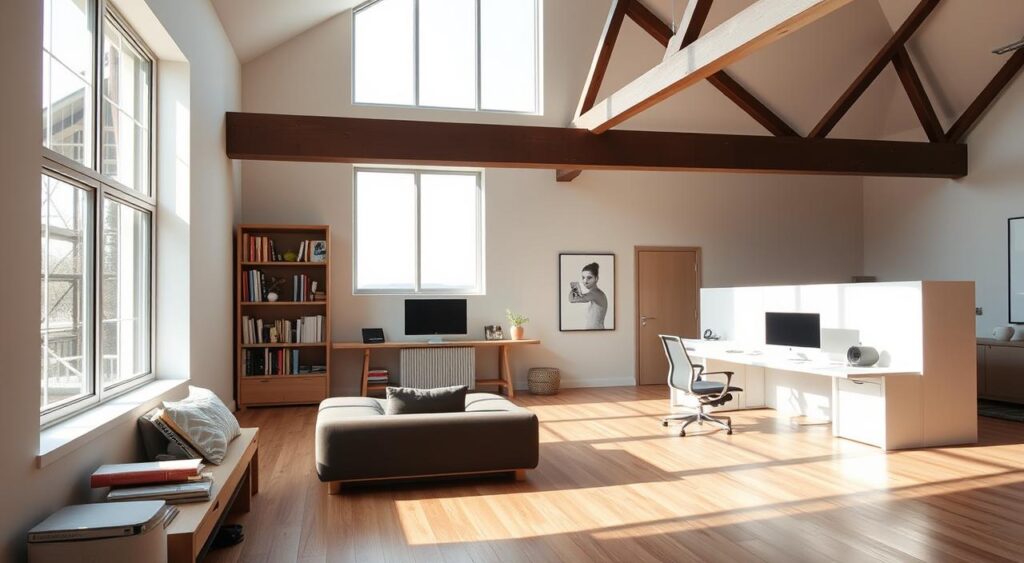
Garage Conversions
Garage conversions are a budget-friendly option to add space. They usually cost between £5,000 to £20,000, based on the garage’s condition and the new space’s purpose.
A recent survey shows that a well-planned extension can recoup up to 100% of its cost at resale (
Source: Royal Institution of Chartered Surveyors
). This highlights the importance of picking the right extension for your home.
Understanding UK House Extension Cost Breakdown
Planning a house extension in the UK? Knowing the cost breakdown is key to budgeting well. Understanding the different parts of the cost helps homeowners make smart choices and avoid surprises.
Architectural and Design Fees
Architectural and design fees are a big part of the cost. These fees change based on the design’s complexity and the architect’s experience. Typically, architectural fees range from 10% to 15% of the total construction cost. It’s wise to get quotes from several architects to compare their services and fees.
Building Materials
Building materials are a big expense. The cost varies a lot based on the material’s quality and type. For example, choosing high-end finishes like marble or bespoke cabinetry will cost more than standard materials. It’s important to find a balance between quality and budget.
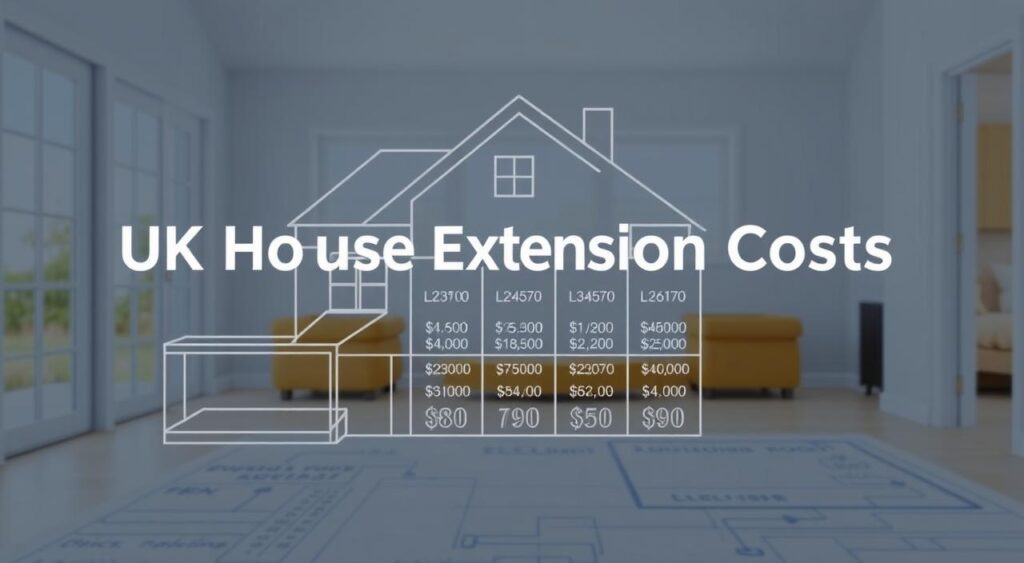
Labour Costs
Labour costs for house extensions are significant, often making up 40% to 50% of the total cost. The work’s complexity, the extension’s size, and location all affect labour costs. Getting a detailed quote from your contractor is essential to manage these costs.
Fixtures and Fittings
Fixtures and fittings, like kitchen and bathroom installations, add a lot to the cost. The choice between standard and bespoke fixtures greatly impacts the expense. Planning and selecting fixtures that fit within your budget is vital.
Additional Professional Services
Additional professional services, such as structural engineers, project managers, and surveyors, may be needed, adding to the cost. Knowing when these services are necessary and their costs helps plan the project better.
Breaking down the costs into these parts helps homeowners understand where their money goes. This way, they can make better decisions about their house extension project.
Key Factors Affecting Your Extension Budget
Knowing what affects your house extension cost is key to budgeting well. Many things can change the price, and knowing them helps you plan better.
Size and Complexity of Design
The size and design of your extension matter a lot. Bigger and more complex designs need more materials and work. This makes them more expensive. Simple designs are usually cheaper.
Materials and Finishes Quality
The quality of materials and finishes you pick can really change your budget. High-quality materials and custom finishes cost more than standard ones. It’s important to think about both quality and cost.
Location and Accessibility
Where your property is and how easy it is to get to can also change the cost. Hard-to-reach sites might need special tools, raising labour costs. Also, the soil where your property is can affect the foundation needed.
Structural Considerations
Thinking about the structure of your extension is very important. Checking the state of your current building helps spot any extra costs.
Foundation Requirements
The foundation your extension needs depends on soil type and how heavy it will be. This can greatly affect the cost.
Existing Building Condition
The state of your current building can also impact the cost. If your building needs repairs or strengthening, it will cost more.
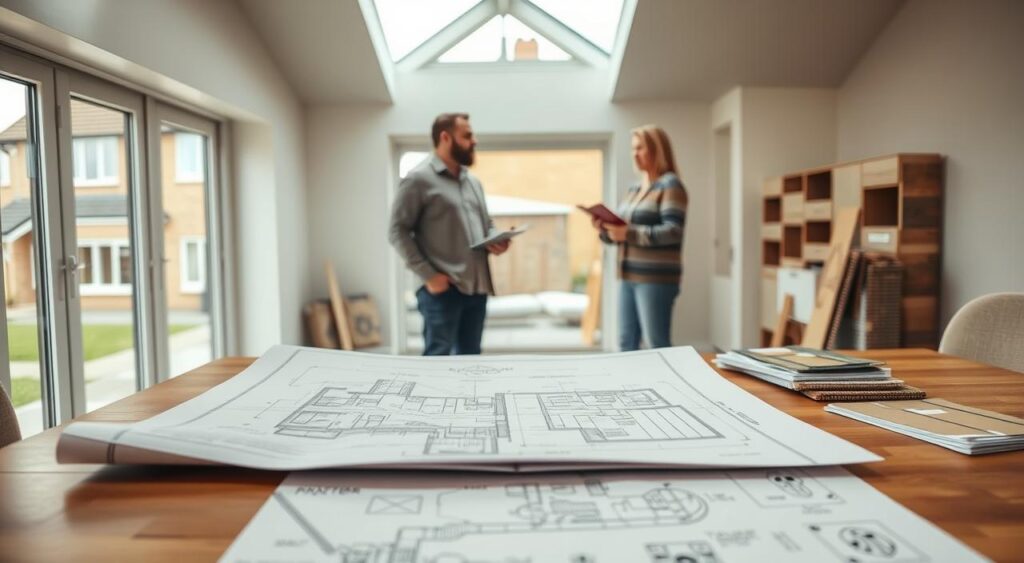
Planning Permission and Building Regulations: Costs and Considerations
To keep your house extension project on track, it’s key to include costs for planning permission and building regulations. Knowing these costs helps you budget better and avoid problems.
Planning Application Fees
The cost of a planning application changes based on your extension’s size and type. In England, most applications cost £462. But, larger extensions might cost £528. Always check the latest fees on the UK Government’s website or talk to your local planning authority.
Building Regulations Approval Costs
Getting Building Regulations approval is different from planning permission. It makes sure your extension is safe and energy-efficient. The cost can be between £300 and over £1,000. This depends on how complex your project is and if you use a professional to prepare the documents.

Party Wall Agreements
If your extension touches a shared wall with a neighbour, you might need to serve a party wall notice. This isn’t an approval process, but it can cost money, like surveyor fees if there’s a dispute. Following the right steps can prevent neighbour problems.
Permitted Development Rights
Many extensions don’t need full planning permission because they’re under Permitted Development Rights. But, you must check if your project meets the criteria. If you’re not sure, getting advice from a professional can save you from expensive errors.
| Regulatory Requirement | Typical Cost | Notes |
|---|---|---|
| Planning Application Fee | £462 – £528 | Variable depending on extension size |
| Building Regulations Approval | £300 – £1,000+ | Dependent on project complexity |
| Party Wall Agreement | Variable | Includes surveyor fees if disputes occur |
Knowing and planning for these costs is vital for a successful house extension. Being informed helps you move through the process easily and avoid extra costs.
How to Create a Realistic Extension Budget
When planning a house extension, setting a realistic budget is essential. You must think about many things that affect the cost. These include design, materials, labour, and extra professional services.
Step-by-Step Budgeting Process
To make a good budget, first decide on your project’s scope. This means figuring out the size and how complex the extension will be. Then, get quotes from contractors, architects, and suppliers to understand the costs.
Split your budget into parts like architectural fees, materials, labour, and fixtures. This way, you can see where you might need to make changes.
Including a Contingency Fund
It’s important to have a contingency fund for your extension budget. This fund helps cover unexpected costs, which are common in building projects. Aim to save 10% to 20% of your total budget for this fund.
Financing Options for UK Homeowners
UK homeowners have several ways to fund their house extension projects.
Mortgage Extensions
One option is to increase your mortgage. This works if you have enough equity in your home. Talk to your lender and a financial advisor to understand the pros and cons.
Home Improvement Loans
Another choice is a home improvement loan. These loans are made for renovation projects and often have good interest rates. Look at different loans to find the best one for your finances.

By following a clear budgeting process, setting aside a contingency fund, and looking at financing options, you can make a solid budget for your extension. This way, you can manage your money well and complete your project successfully.
Finding and Vetting Reliable Contractors
Finding a trustworthy contractor is key for a house extension. You want someone who gets your vision and can make it real.
Sourcing Reputable Builders
Start by asking friends, family, or neighbours for builder recommendations. Check online reviews on Trustpilot or Checkatrade. Make sure the builders are registered with a reputable trade body, like the Federation of Master Builders (FMB).
Comparing Quotes Effectively
Don’t just look at the price when comparing quotes. Check what’s included, the materials, and the timeline. A good quote should list labour, materials, and other expenses clearly. Be cautious of very low quotes, as they might mean the contractor doesn’t fully understand the project.

Red Flags to Watch For
Watch out for contractors who want payment upfront, have poor communication, or lack insurance. These signs can mean they’re not reliable. Always check for public liability insurance and ensure they have the right certifications.
Contract Essentials
A detailed contract is essential. It should cover the work, payment, and timeline. Make sure you understand everything before signing. A good contract protects both you and the contractor, guiding the project.
DIY vs Professional Work: Cost Implications
Choosing between DIY and hiring pros for your house extension affects your budget. DIY saves on labour costs but needs a lot of time. It can also lead to expensive errors if not done right.
What You Can Safely DIY
You can handle some parts of a house extension, like decorating or fitting fixtures, if you know what you’re doing. But, tasks that need special skills or are risky should go to the experts.
When to Always Hire Professionals
For tasks like structural work, electrical, and plumbing, always get a pro. They ensure safety and follow building rules.
Hidden Costs of DIY Approaches
DIY might look cheap at first, but there are hidden costs. These include fixing mistakes, safety risks, and the value of your time.
| Task | DIY Cost | Professional Cost |
|---|---|---|
| Decorating | £500-£1,000 | £1,500-£3,000 |
| Structural Work | £0 (if done correctly) | £5,000-£10,000 |
| Electrical Installations | £0 (if done correctly) | £2,000-£5,000 |
Deciding between DIY and hiring pros depends on your skills, the task’s complexity, and the risks. Knowing the costs helps you choose wisely, fitting your budget and project aims.
Timeline Considerations: How Duration Affects Cost
Knowing the timeline of your house extension project is key. It affects the cost directly. A longer project can mean higher labour costs and more for accommodation if you have to move out. Delays can also increase the total cost.
Average Project Timelines
A house extension project can last from a few weeks to months. For example, a single-storey extension might take 8 to 12 weeks. A double-storey extension could take up to 6 months or more. It’s important to get a realistic timeline from your contractor to plan your budget.
Seasonal Factors
Seasonal factors can change your project timeline and cost. Building in winter might cost more due to weather delays. Starting in the off-season could get you better rates from contractors.
Accommodation Costs During Construction
If you have to leave your home during construction, accommodation costs are a factor. These costs vary depending on whether you rent or stay in a hotel. Planning for these costs in advance can help manage your finances.
Managing Delays and Budget Impact
Delays are common in construction projects. To protect your budget, have a contingency fund. This fund should be 10-20% of your total project cost. Keeping in touch with your contractor and having clear communication can help avoid delays.
| Project Type | Average Duration | Potential Additional Costs |
|---|---|---|
| Single-Storey Extension | 8-12 weeks | Labour costs, material price fluctuations |
| Double-Storey Extension | 6 months+ | Accommodation costs, delay penalties |
Understanding and planning for these factors can help manage your house extension project’s timeline and cost. This ensures a smoother process from start to finish.
Cost-Saving Strategies Without Compromising Quality
You don’t have to spend a lot to get your dream house extension. There are many ways to save money without sacrificing quality. By choosing wisely and planning well, you can make a beautiful and useful extension without spending too much.
Material Alternatives and Substitutions
One smart way to cut costs is to look for cheaper materials that look and work like the expensive ones. For example, you could use engineered wood instead of solid hardwood for floors. Or, choose laminate countertops over granite. A cost-saving expert says, “Switching materials can cut costs a lot without losing the look and feel of your extension.”
Phasing Your Project
Breaking your extension project into phases can also save money. Doing one part at a time helps you control your budget better. This way, you can focus on the most important parts first and save the less urgent parts for later.
Energy-Efficient Choices That Save Long-Term
Energy-saving options might cost more upfront, but they save a lot in the long run. For example, double-glazed windows or better insulation can lower your energy bills. A study found, “Homes with energy-saving features sell for more and cost less to run.”
Reusing and Upcycling
Using old materials in new ways is a creative way to save. It also makes your extension unique and eco-friendly.
Salvaging Existing Materials
Think about using materials from your old house, like reclaimed wood for floors or fixtures.
Second-hand Fixtures and Fittings
Look for second-hand stores or online for unique fixtures and fittings. They can add character to your extension without the high cost.
By using these smart saving tips, you can get a top-quality house extension that fits your budget. As a savvy homeowner once said, “It’s not just about saving money; it’s about making smart choices that improve your home’s value and use.”
Return on Investment: Will Your Extension Add Value?
Thinking about a house extension? A big question is if it will increase your property’s value. The answer depends on several things. These include the type of extension, the quality of work, and the local property market.
Average Value Added to UK Properties
A well-designed and well-built house extension can recover a lot of its cost when you sell. Data shows a single-storey rear extension can add 5-10% to your property’s value. A loft conversion can boost it by up to 20%. But, these numbers can change based on your property’s location, size, and the quality of the extension.
Most Valuable Types of Extensions
Some extensions are more valuable than others. For example, loft conversions and basement extensions are often more valuable. They add living space without changing the property’s size. A well-designed single-storey extension can also be very valuable. It makes the indoor and outdoor spaces blend smoothly.
Regional Variations in ROI
The return on investment for house extensions varies across the UK. Properties in London and the South East tend to have higher ROI due to the competitive market. In contrast, areas with lower demand might see less significant increases in property value. Knowing your local market is key to making a smart decision.
Future-Proofing Your Investment
To make sure your extension adds value and stays relevant, think about energy-efficient features and flexible living spaces. These features make your property more appealing to buyers and support a sustainable lifestyle. Also, using high-quality materials and finishes can make your extension last longer and look better.
By planning your extension carefully and considering these factors, you can get the most out of your investment. This way, you’ll enjoy a more spacious and valuable home.
Conclusion: Making Informed Decisions About Your House Extension
Planning your house extension carefully is key to getting what you want without overspending. Knowing what affects UK house extension costs helps you make smart choices. This way, you can stay within your budget and meet your needs.
The cost of extending your home in the UK changes a lot. It depends on the type of extension, the materials, and the labour costs. To have a successful project, setting a realistic budget is vital. Also, finding reliable contractors and looking for ways to save money are important steps.
This article has given you the tools to handle the challenges of house extension planning. You’ll be ready to make choices that improve your home’s value. Whether you want to add a single-storey extension or convert your loft, good planning will help you succeed.
FAQ
What is the average cost of a house extension in the UK?
The cost of a house extension in the UK changes based on location, size, and complexity. You might pay between £1,500 to £3,000 per square metre.
How much does a single-storey extension cost?
Single-storey extensions usually cost between £1,500 to £2,500 per square metre. The final cost depends on the size and materials used.
Do I need planning permission for a house extension?
Not always. Many extensions are allowed under permitted development rights. But, always check with your local authority to see if you need planning permission.
What are the costs associated with building regulations approval?
The cost for building regulations approval varies. You might pay between £200 to £500 for a full plans application. For a building notice, it’s £150 to £300.
How can I reduce the cost of my house extension?
To cut costs, choose a simpler design and use affordable materials. Phasing your project can also help. Reusing materials can save money too.
What is the return on investment for a house extension?
A well-planned extension can significantly increase your property’s value. The return on investment can be 50% to 100% of the extension’s cost, depending on the quality.
How long does a house extension project typically take?
The time needed for a house extension varies. It depends on the project’s size and complexity. Expect it to take from a few weeks to several months.
What are the key factors that affect the cost of a house extension?
Several factors influence the cost of a house extension. These include the design’s size and complexity, the quality of materials, location, and structural needs.
Can I DIY any part of my house extension?
You can DIY some parts, like decorating or installing fixtures. But, it’s wise to hire professionals for the main construction. This ensures quality and safety.
How can I find a reliable contractor for my house extension?
To find a reliable contractor, look for reputable builders. Compare quotes and watch for red flags like bad reviews or poor communication.

